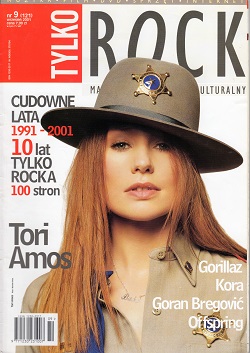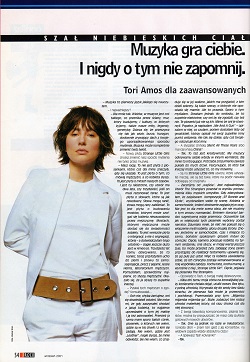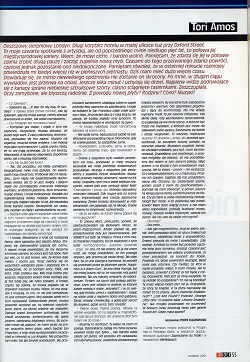|

songs | interviews | photos | tours | boots | press releases | timeline
Tylko Rock (Poland)
September 2001

The music is you. And don't forget about it.
Tori Amos for advanced.
By Piotr K.
It's rainy August in London. Long hall in a hotel, on little street, next to the Oxford Street. That's my fourth meeting with the artist, but the last one was almost five years after, that is a half of her international career. I know, that she's talking silently. And very slowly. I remember, that sometimes she do a long pause and she's starting a new idea. Sometimes she goes back to the undone sentence, but most of the time the clauses are unfinished. I remember too, that in the last minute of the interview she told me once many more than in fifteen. Today I'll have much more time. I found out that we're a little late, but the interview wouldn't be shorten. After me, there is a lunch break. Few minutes and the door are opened. First I see blue shorts, very tight squeezed that are getting up from the sofa. She's slimmer... Her eyes are far away from here but they sparkle. Because of new album? Family? Daughter? Music?
Tori: Music is the first language I've ever learnt.
Piotr: The most important?
Tori: To me, yes. You know... there's something about the language of music that can really permeate walls that we've built, you know, we all each have our structures that are built from the culture we're brought up in, from our myths and legends, of our own genetic legacy. It enters in, maybe, underneath your structure - like wind, like a storm, like a hurricane. It might tear your roof off when you hear something, change the way you see the world.
Piotr: With your new album "Strange Little Girl" you want to change people's way of thinking not only with music?
Tori: Yes, you're right. ... It gets a little complicated though, because this is not just about songs that meant something to me when they came out. This is about how men say things and how a woman hears. This is about the myths of our time, now. What are they? Whether a song is 30 years old or 2 years old, it had to resonate with that. This is about... words are like guns. Words can wound and words can heal. This is about building a bridge where a woman could go crawl behind the corridors of men's eyes, and hang in their heads, likewise, a man can crawl back over that bridge and access a woman's perception - which is a very intimate thing, her perception! So that is the album about integration and not about a segregation which I saw happening in America at this time as I was nursing my baby. Thirty years ago they promise that this is the end, and now I set my ear and it's the same: segregation, nope for gay, Jessie Helms, men's laboratory. I thought: "first, I must hear how men hear men". And then see how a woman hears that - it turned out to be completely different.
Piotr: So did you ask the men who wrote those songs?
Tori: Oh no! No! I left this to the eleventh hour, are you kidding me? I was having a relationship with their daughters! Don't tell me every woman you've gone out with, you've called the mother and gone out with her too. You know, I have a lot of song-daughters that, I don't know where 'Leather' is right now. I have no idea what she's up to. I hear she's gonna come and visit, but I don't know what she's got in her suitcase! I don't know how many shots she's had to have since I last saw her. I don't know what she's up to. She has made friends, she has shared secrets. There are things that can't be told to mother. But it's true. I did approach this with --- a lot of thought. And this was not about if they agreed with it or not, because the songs - they aren't their songs now. Though that they create them! I wrote a song 'Me and a Gun'. I shared my point of view. I have gotten letters from rapists who see it very differently. But that's what happens when you harness a myth and put it out there.
(... - about chinese "Silent All These Years" and mandarin "China")
Piotr: On "Strange Little Girls" there are songs that you heard in a different way, but there are songs too that are quite similar to the original.
Tori: Well, first let's go to entry point. Entry point is crucial. For the Stranglers' song this was brought, it was, um... the Stranglers were brought up by a few of the brain-trust of men. After I knew I was doing Bonnie and Clyde, she spoke to me, her character, in that myth, spoke to me. So, that song, my interest became about that song, because, you know, the reality of a woman being in a car... staring death in the face is something that I... I personally resonate with. And we don't have to go any further into that. Eminem created a very powerful reflection of domestic violence. He made a choice as a writer, as all of them did, on the character that they would align with. ... What blew me away is that none of these men, the brain-trust, asked about her, not one of them. So this version, that you hear on this record, "Strange Little Girls" - go back to the same time-frame, go back to the exact same time-frame, in the car, as he is telling their little girl... what happened. And - you cut to the cameras moving now on the woman in the back and how she is hearing, (or) hearing her filter. She is not dead yet [in my version], she is almost dead. And you know, that is the tricky, tricky thing, when you kill your wife, you better check her pulse before you're cashing in on that will, you better know she's cought(?) - so she's hearing, this was a kicker for me when she showed me this, that her daughter is being made an accomplice. And will be devided forever between the two of them. Loving her father, loving her mother, like most kids do. She will grow up to be a strange little girl. Cut to the Stranglers Song. And that's our little girl grown up - end of story.
Piotr: Tell us about Tash, your little girl.
Tori: A few days ago my daughter on the Cornwalian beach wants to hug the ocean. Without fear and full of trust. She go to the water without dread that the first wave could fall her down. She was telling: "Mijamba mijamba mijamba ga". Oh God... if you see that kind of confidence of this little human, you want to create something for him.
This interview aired on Polish Radio 3 in August 2001.
original article
 
[scans by Sakre Heinze]
t o r i p h o r i a
tori amos digital archive
yessaid.com
|